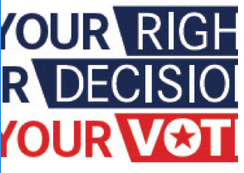Tips for Managing Post-Election Anxiety
Posted: November 7, 2016

Inevitably November 8, 2016 will come and go. Inevitably, someone has to lose…and someone will win. Guess what? You will survive. While quite an adversarial process this year with nasty debates and people taking sides, losing friendships, and some even changing political parties…you will still survive.
According to the American Psychological Association, facing one of the most adversarial contests in recent history and daily coverage of the presidential election that dominates every form of mass media, 52 percent of American adults report that the 2016 election is a very or somewhat significant source of stress. The survey was conducted online among adults 18+ living in the U.S. by Harris Poll. This may be including you!
It seems that there is an air of distrust, lack of faith in leadership, poor communication, hurt and anger that permeates our current national societal and political climate. There are conflicts – socially, ethnically, racially and politically – that have permeated our society and profession, affecting all of us in different ways [sic].
“Election stress becomes exacerbated by arguments, stories, images and video on social media that can heighten concern and frustration, particularly with thousands of comments that can range from factual to hostile or even inflammatory,” said Bufka, APA.
APA offers the following tips to help people manage their stress related to the election:
· If the 24-hour news cycle of claims and counterclaims from the candidates is causing you stress, limit your media consumption. Read just enough to stay informed. Turn off the newsfeed or take a digital break. Take some time for yourself, go for a walk, or spend time with friends and family doing things that you enjoy.
· Avoid getting into discussions about the election if you think they have the potential to escalate to conflict. Be cognizant of the frequency with which you’re discussing the election with friends, family members or coworkers.
· Stress and anxiety about what might happen is not productive. Channel your concerns to make a positive difference on issues you care about. Consider volunteering in your community, advocating for an issue you support or joining a local group. Remember that in addition to the presidential election, there are state and local elections taking place in many parts of the country, providing more opportunities for civic involvement.
· Whatever happens on Nov. 8, life will go on. Our political system and the three branches of government mean that we can expect a significant degree of stability immediately after a major transition of government. Avoid catastrophizing, and maintain a balanced perspective.
· Vote. In a democracy, a citizen’s voice does matter. By voting, you will hopefully feel you are taking a proactive step and participating in what for many has been a stressful election cycle. Find balanced information to learn about all the candidates and issues on your ballot (not just the presidential race), make informed decisions and wear your “I voted” sticker with pride.
If you or a loved one is feeling more distressed post-election, including suicidal, please ask for help. Did you know that after the stock market collapse of October, 2008 and until the day the stock market rebounded in March, 2009, evidence supplied by Google Trends suggests that there was a sharp increase in interest in people curious about how they could kill themselves. The bulk of these requests were coming not from Wall Street but from places ranging from Wisconsin to Utah as Main Street America dealt with the ramifications of falling 401ks, increased distance to retirement, and underwater mortgages. The Great Crash of 1929—and, to a lesser extent, the crash of 1987—did lead some people to commit suicide. But in nearly all of those cases, the deceased had suffered a major loss when the market collapsed (web resource).
In sum, we all have to remind ourselves that no one person controls our destiny in their hands. That even if policies change that restrict fair trade or impose values onto our lifestyle that we do not agree with does not mean I succumb to the pressure of conformity. God is STILL in control.

